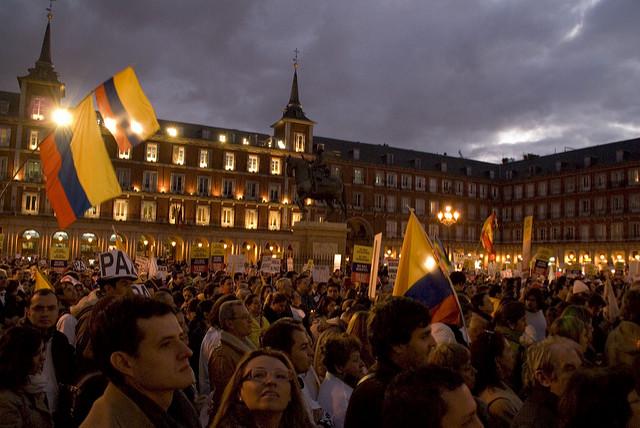Closing Colombia’s war: a plebiscite then peace?
Posted By Cesar Alvarez on September 2, 2016 @ 11:00

The war in Colombia is over. But it’s too early to celebrate.
The Colombian government and the FARC rebels last week announced that they’d settled a final peace deal that will end 52 years of fighting—and the longest-running conflict in the Americas.
Getting signatures on the deal is a historic achievement, but peace in Colombia won’t be achieved with pen strokes alone. Indeed, a Brexit-like plebiscite is the only thing standing in between three generations of Colombians and their first day of peace in over half a century.
President Santos referred to the plebiscite, which is currently scheduled for 2 October [1], as the most important visit to the polls in Colombian history.
Will Colombia say no to peace with the FARC? It’s hard to tell how this peace deal will unfold. The latest polls show mixed results [2]. Since 2 August, the ‘no’ votes drew closer to the ‘yes’ votes five times. But the last poll revealed that the ‘yes’ is expected to win with 32.1% support over a 29.9% ‘no’ vote. But the polls are neck and neck—it’s anyone’s guess at this stage.
What we can tell is that the government isn’t in a comfortable position, for instance, by looking at the President’s plunging approval ratings. Santos reached a new low of 21% in the most recent polling [3], his lowest figure since taking office 2010.
That may be music to the ears of former president Alvaro Uribe ahead of his ‘vote no’ plebiscite campaign. But with only 4.4 million votes (13%) of registered voters endorsing the deal, Uribe’s hopes to negotiate a different one and postpone the celebration will likely be shattered.
And what if Colombia say yes? Even if Colombians push the final deal through, peace should be met with cautious optimism. Significant challenges to implement this deal lie ahead.
Transitional justice was highly controversial for the duration of negotiations. Impunity is a constant concern among sectors of society and among some politicians. Peacemaking has a sweet and sour flavor, but any aftertaste of impunity will affect peacebuilding in the long-term.
FARC has to approve the accord during its 10th—and hopefully final—conference. It’s a necessary step for the top leaders’ buy-in. It could also be a moment for internal dissent about the agreement to manifest. That’s unlikely to be a big issue as FARC leaders have been informally discussing the accords for years, but it could weaken the demobilisation process.
In an agreed process, FARC members will hand their weapons to a UN mission and begin their reintegration into Colombian society. But landmines remain a significant barrier for thousands of FARC rebels seeking to transition to normal life and will likely seek to settle in Colombia’s country regions rather than major urban areas.
That affects victims, too. For Colombia’s six million internally displaced people [5]—the second largest number in the world—landmines could get in the way of their fresh start once rural areas under control of FARC begin to open up.
Another challenge for a post-peace deal Colombia is serious organised crime, particularly drug trafficking. According to the annual United Nations report on Illicit Crop [6], Colombia’s coca crop increased 39% last year and has doubled since 2013, meaning that Colombia is once again the world’s top coca producer. Having a major coca problem can increase violence in urban areas while undermining the effects of FARC’s definite ceasefire. FARC’s absence could create a vacuum that any number of other criminal groups already in the jungle may seek to fill, giving rise to more violence.
Regardless of those challenges, Colombia has made impressive, if hard-won, gains in economic growth, citizen security, and improving the rule of law over the last decade. This has contributed significantly to the reduction of violence in rural areas [7] in recent years. The final peace deal between the government and FARC is another monumental step forward.
If everything goes according to plan, next month’s highly-anticipated symbolic ceremony (especially by those seeking to make political mileage [8] out it) will mark the beginning of a new chapter in Colombia’s history. FARC will move from the jungle to the Congress, trading their camouflage for suiting as over 47 million optimistic eyes watching.
The road ahead will put Colombia’s patience, forgiveness, and adaptability to the test. Peacebuilding takes time, requires sacrifice and is driven by real change. The final deal isn’t the perfect deal, but it’s the best deal possible. Both sides would have liked to achieve more, but—at least for now—everything the deal appears done. Colombians will now have to decide whether this is the right tool for building a lasting peace before they can celebrate.
Article printed from The Strategist: https://aspistrategist.ru
URL to article: /closing-colombias-war-plebiscite-peace/
URLs in this post:
[1] which is currently scheduled for 2 October: http://americasquarterly.org/content/week-latin-america-cease-fire-colombia
[2] show mixed results: http://www.eltiempo.com/politica/proceso-de-paz/encuesta-sobre-plebiscito-por-la-paz/16681725
[3] recent polling: http://colombiareports.com/santos-sets-another-personal-worst-21-approval-rating/
[4] Colombia is the second most mine-affected country in the world after Afghanistan, and the source of the most new landmine victims: http://www.the-monitor.org/en-gb/reports/2015/landmine-monitor-2015/casualties-and-victim-assistance.aspx
[5] six million internally displaced people: http://www.internal-displacement.org/global-figures
[6] United Nations report on Illicit Crop: http://www.unodc.org/documents/crop-monitoring/Colombia/Monitoreo_Cultivos_ilicitos_2015.pdf
[7] reduction of violence in rural areas: http://blog.cerac.org.co/un-ano-de-desescalamiento-conflicto-casi-detenido
[8] those seeking to make political mileage: http://www.semana.com/nacion/articulo/proceso-de-paz-vargas-lleras-en-campana-por-el-plebiscito-por-la-paz/491368
Click here to print.